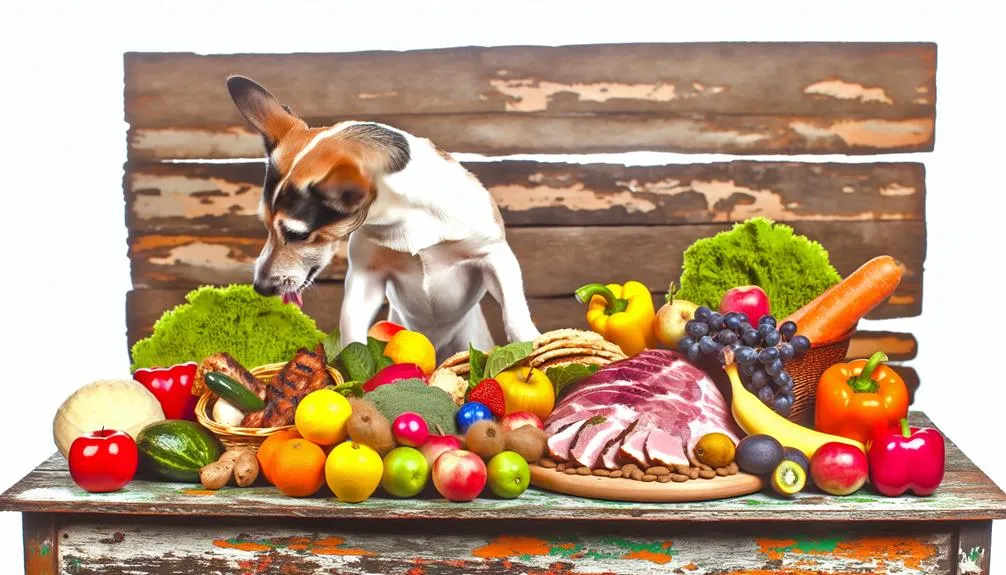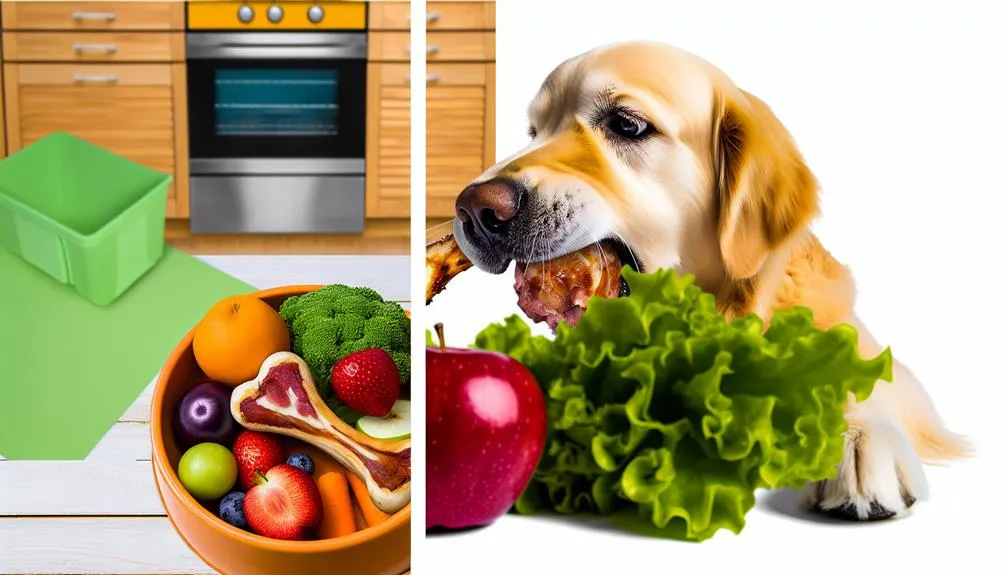
Are Dogs Omnivores
Did you know that nearly 80% of dog owners believe their pets thrive solely on meat-based diets? This common misconception raises important questions about canine nutrition and the broader implications for your dog's health. While many people think dogs are strict carnivores, the truth is more nuanced. Exploring their evolutionary background and unique digestive systems can shed light on their dietary needs. What do these factors reveal about the best way to nourish your canine companion?
Evolutionary Background of Dogs
The evolutionary background of dogs reveals a complex history that intertwines with both wild ancestors and human intervention. The domestication process of dogs began approximately 20,000 to 40,000 years ago when early humans and their wild ancestors, such as wolves, formed a symbiotic relationship. This relationship was likely rooted in mutual benefits, where wolves scavenged near human settlements while humans gained protection and assistance in hunting.
As humans began to settle and form agricultural communities, the domestication process accelerated. selective breeding practices started to emerge, emphasizing traits that would be beneficial to humans, such as tameness, loyalty, and specific working abilities. Over generations, these practices led to significant morphological and behavioral changes in dogs, differentiating them from their wild ancestors. The varied roles dogs played—from herding livestock to serving as companions—further shaped their evolution.
Genetic studies reveal that domestic dogs share a significant amount of DNA with their wild ancestors. However, it is essential to recognize that domestication has led to a divergence that affects not just physical traits but also dietary adaptations. While wild ancestors were primarily carnivorous, the domestication process allowed dogs to adapt to a more diverse diet, influenced by human food sources. This adaptability plays a vital role in understanding whether dogs can be classified as omnivores.
Ultimately, the evolutionary journey of dogs demonstrates how their wild ancestors influenced their development, particularly through the domestication process, leading to the unique species we have today.
Canine Digestive System
Dogs possess a specialized digestive system that reflects their evolutionary adaptations and dietary flexibility. Their canine anatomy is designed to efficiently process a variety of foods, which is essential for their survival and health. The digestive tract of dogs is relatively short compared to herbivores, allowing for quicker digestion and absorption of nutrients. This shorter gastrointestinal tract is indicative of their omnivorous capabilities, as they've evolved to consume both animal proteins and plant materials.
In your dog's mouth, you'll find sharp teeth that help tear and grind food, while saliva contains digestive enzymes that begin the process of breaking down carbohydrates. Once the food reaches the stomach, powerful acids and additional digestive enzymes continue this breakdown, allowing nutrients to be extracted efficiently.
The small intestine plays a significant role in nutrient absorption, where enzymes further digest proteins, fats, and carbohydrates into their constituent parts. Importantly, the pancreas produces essential digestive enzymes that aid in this process. After the small intestine, the remaining material moves to the large intestine, where water is absorbed and any undigested food is prepared for excretion.
Understanding your dog's digestive system is critical for providing an appropriate diet. Their unique anatomy and the presence of various digestive enzymes allow them to thrive on a diverse range of foods, reinforcing their status as adaptable omnivores.
Nutritional Needs of Dogs

Understanding a dog's digestive system lays the groundwork for recognizing its nutritional needs. Dogs, being omnivores, require a balanced diet that includes a variety of food sources. A well-rounded diet should consist of protein sources, carbohydrates, fats, vitamins, and minerals. It's essential to guarantee that your dog gets adequate protein, as it plays a critical role in muscle development, immune function, and overall health.
When considering dietary balance, you'll want to aim for a ratio that supports your dog's specific life stage—puppy, adult, or senior. Generally, adult dogs thrive on a diet containing approximately 18-25% protein, while puppies need around 22-32%. This variation underscores the significance of tailoring feeding guidelines to your dog's age, size, and activity level.
Key nutrients should never be overlooked. Omega fatty acids, for example, contribute to a healthy coat and skin, while antioxidants support immune health. Including a mix of animal-based and plant-based protein sources helps guarantee a thorough amino acid profile.
While commercial dog foods often meet these nutritional needs, if you plan to prepare homemade meals, it's essential to consult with a veterinarian or pet nutritionist. They can help you establish a balanced diet that fulfills your dog's specific requirements. Remember that hydration is equally important; always provide access to fresh water. By focusing on these elements, you can maintain ideal health and well-being for your canine companion.
Benefits of an Omnivorous Diet
A balanced omnivorous diet offers a variety of health benefits for your dog that can enhance its overall well-being. By incorporating diverse food sources, you can guarantee your dog receives a nutrient balance that supports its health across different life stages. This dietary variety not only satisfies your pet's taste preferences but also provides essential vitamins and minerals.
Here are some key benefits of an omnivorous diet:
- Improved Nutrient Absorption: Different food sources provide complementary nutrients, enhancing your dog's ability to absorb and utilize them effectively.
- Enhanced Immune Function: A diverse diet can strengthen your dog's immune system, helping it fend off illnesses and infections.
- Better Weight Management: With the right feeding strategies, an omnivorous diet can help maintain a healthy weight, reducing the risk of obesity-related conditions.
- Longevity Impact: A well-rounded diet can contribute to a longer, healthier life by reducing the risk of chronic diseases associated with nutrient deficiencies.
When selecting food sources, consider proteins, grains, fruits, and vegetables to maximize nutrient intake. Carefully planning your dog's meals can lead to significant health benefits, making it essential to understand how dietary variety influences their overall health. By adopting effective feeding strategies that cater to your dog's specific needs, you can help guarantee its longevity and health, ultimately enhancing its quality of life.
Common Misconceptions About Dog Diets

Many pet owners hold misconceptions about dog diets that can impact their pets' health and nutrition. One prevalent myth is that dogs should eat only meat, as they're often thought of as carnivores. However, myth debunking reveals that dogs are omnivores, which means they thrive on a diverse diet that includes vegetables and grains in addition to proteins. This diet diversity is vital for providing essential nutrients that support their overall health.
Another common misconception is that all human food is harmful to dogs. While certain foods, such as chocolate and onions, are indeed toxic, many human foods can be safely included in a dog's diet. For instance, fruits like apples and vegetables such as carrots can be healthy treats. It's important to research which foods are safe and to introduce new items gradually.
Additionally, some owners believe that commercial dog foods are nutritionally complete, making home cooking unnecessary. While high-quality commercial diets can provide balanced nutrition, preparing homemade meals can also be beneficial if done correctly. Consulting with a veterinarian or a pet nutritionist can help guarantee that your homemade meals meet all of your dog's dietary needs.
Frequently Asked Questions
Can Dogs Eat Chocolate or Other Toxic Human Foods?
Dogs shouldn't eat chocolate due to chocolate toxicity, which can cause serious health issues. Additionally, many human food dangers exist; some foods can be harmful or fatal. Always prioritize your dog's safety by avoiding these treats.
How Can I Tell if My Dog Has Dietary Allergies?
To identify dietary allergies in your dog, watch for symptoms like itching or gastrointestinal issues. Allergy testing can confirm specific allergens, helping you tailor their diet and avoid problematic ingredients effectively. Regular monitoring is essential.
Are Commercial Dog Foods Safe for All Breeds?
Not all commercial dog foods are safe for every breed. Consider the commercial food quality and breed-specific nutrition; tailored diets can address unique health needs, ensuring your dog receives ideal nourishment for their specific requirements.
Can a Dog Thrive on a Vegetarian or Vegan Diet?
While some dogs can thrive on a vegetarian diet, vegan diets present challenges. You'll need to guarantee adequate protein, vitamins, and minerals, balancing vegetarian benefits with potential nutritional deficiencies to keep your dog healthy.
How Often Should I Change My Dog's Diet?
You should change your dog's diet every few months for dietary variety. Always make gradual changes to avoid digestive upset. Monitor your dog's health and adjust accordingly to guarantee they're thriving on the new diet.
Conclusion
To summarize, understanding that dogs are omnivores can help you make informed dietary choices for your furry friend. With their evolutionary background and unique digestive systems, they thrive on a variety of foods. By embracing a balanced diet, you'll guarantee your dog gets the essential nutrients needed for peak health. Remember, variety is the spice of life, and incorporating both animal and plant-based foods can lead to a happier, healthier pup.
You may also like
Archives
Calendar
| M | T | W | T | F | S | S |
|---|---|---|---|---|---|---|
| 1 | 2 | 3 | 4 | 5 | 6 | |
| 7 | 8 | 9 | 10 | 11 | 12 | 13 |
| 14 | 15 | 16 | 17 | 18 | 19 | 20 |
| 21 | 22 | 23 | 24 | 25 | 26 | 27 |
| 28 | 29 | 30 | ||||
Leave a Reply